罗宾斯管理学英文第9版
管理学,罗宾斯,9版,英文Robbinsfom906
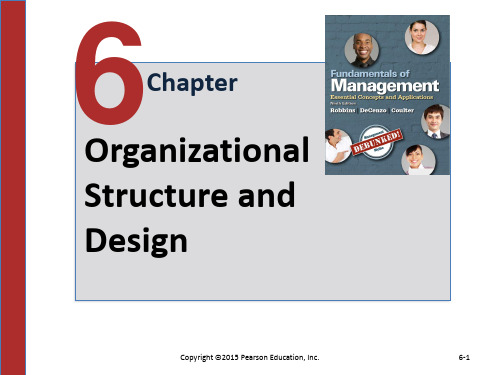
Copyright © 2015 Pearson Education, Inc.
6-2
6.1 Describe six key elements in organizational design.
Copyright © 2015 Pearson Education, Inc.
6-29
Boundaryless Organizations
An organization whose design is not imposed by a predefined structure.
Copyright © 2015 Pearson Education, Inc.
decision making takes place at upper levels of the organization
Decentralization
lower-level managers provide input or actually make decisions
Copyright © 2015 Pearson Education, Inc.
6-12
Span of Control
Most effective and efficient span depends on: • Employee experience and training (more they
have, larger span). • Similarity of employee tasks (more similarity,
6-32
A Learning Organization
管理学,罗宾斯,9版,英文Robbinsfom913-精品文档31页

Copyright © 2015 Pearson Education, Inc.
1-6
Communication Channels
• Formal channels • Informal channels
Copyright © 2015 Pearson Education, Inc.
1-7
Decoding and Feedback
13 Chapter
Managing Communication and Information
Copyright © 2015 Pearson Education, Incribe what managers need to know about communicating effectively.
1-23
Personal Interaction
Social media can minimize personal interaction.
Copyright © 2015 Pearson Education, Inc.
1-24
Knowledge Management
Cultivating a learning culture in which organizational members systematically gather knowledge and share it with others.
1-22
Legal and Security Issues
• Electronic information is potentially admissible in court
• Sensitive, proprietary information at risk
管理学,罗宾斯,9版,英文Robbinsfom903共33页文档
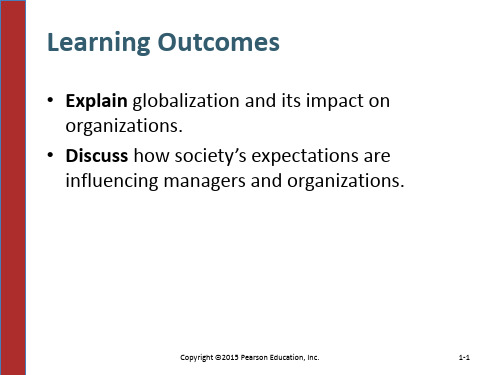
Copyright © 2015 Pearson Education, Inc.
1-12
Society’s Expectations
Copyright © 2015 Pearson Education, Inc.
1-13
Social Responsibility
• Corporate social responsibility (CSR) • Social obligations • Social responsiveness
• Describe how the workforce is changing and its impact on the way organizations are managed.
Copyright © 2015 Pearson Education, Inc.
1-2
3.1 Explain globalization and its impact on organizations.
Copyright © 2015 Pearson Education, Inc.
1-3
Globalization and its Impact
Global village a boundaryless world where goods and services are produced and marketed worldwide.
• Positive? • Negative? • Neutral?
ቤተ መጻሕፍቲ ባይዱ
Copyright © 2015 Pearson Education, Inc.
1-16
Sustainability Means Different Things to Different People
管理学,罗宾斯,9版,英文Robbinsfom909-精品文档35页
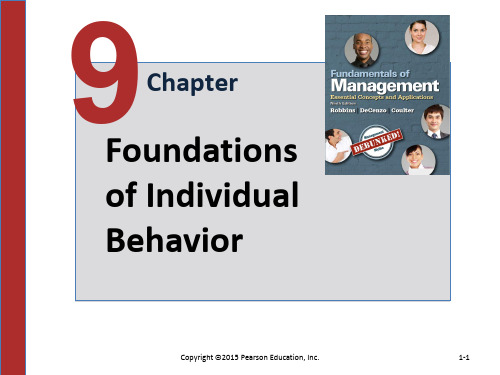
1-11
Personality Theories
Personality: A unique combination of emotional, thought, and behavioral patterns that affect how a person reacts to situations and interacts with others.
Copyright © 2015 Pearson Education, Inc.
1-14
Personality Traits
Can personality traits predict practical workrelated behaviors?
Copyright © 2015 Pearson Education, Inc.
Organizational Behavior
Copyright © 2015 Pearson Education, Inc.
1-5
Goals of Organizational Behavior
1. Employee productivity 2. Absenteeism 3. Turnover 4. Organizational citizenship behavior 5. Job satisfaction 6. Workplace misbehavior
Copyright © 2015 Pearson Education, Inc.
1-18
9.4
Describe perception and the factors that influence it.
Copyright © 2015 Pearson Education, Inc.
管理学,罗宾斯,9版,英文Robbinsfom908-精品文档31页
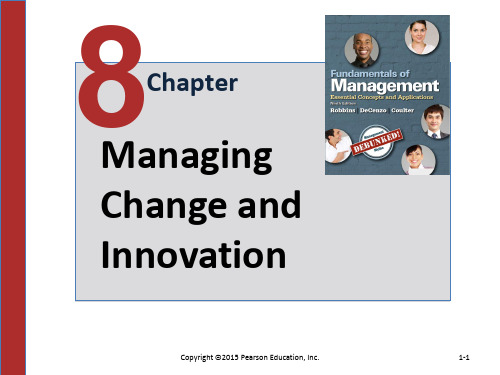
personal loss 4. Belief change is not
in organization’s best interests
Copyright © 2015 Pearson Education, Inc.
1-14
Copyright © 2015 Pearson Education, Inc.
8-5
Internal Factors
• Strategy • Composition of workforce • Employee attitudes
Copyright © 2015 Pearson Education, Inc.
8-24
Innovation Process
1. Perception 2. Incubation 3. Inspiration 4. Innovation
Copyright © 2015 Pearson Education, Inc.
8-25
Encouraging Innovation
Copyright © 2015 Pearson Education, Inc.
Copyright © 2015 Pearson Education, Inc.
8-8
Calm Waters Change
Copyright © 2015 Pearson Education, Inc.
8-9
White-Water Rapids Change
Leading a company in change, in an industry in change.
8-26
Structural Variables and Innovation
管理学,罗宾斯,9版,英文Robbins_fom9_ppt
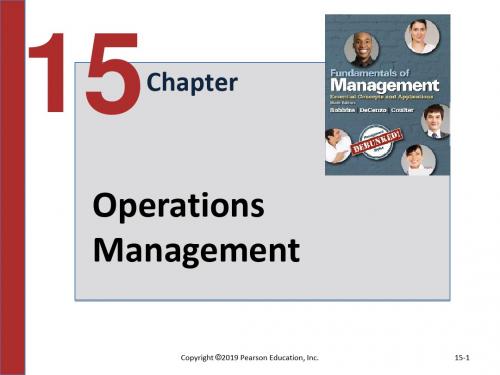
15-17
Employees and Human Resources
• Flexible job design • Effective hiring process • Ongoing training
Copyright ©2019 Pearson Education, Inc.
15-18
Obstacles to Value Chain Management
1. Technology 2. Quality initiatives 3. Project management
Copyright ©2019 Pearson Education, Inc.
15-23
Quality Control
Copyright ©2019 Pearson Education, Inc.
Improving Productivity
Copyright ©2019 Pearson Education, Inc.
15-6
Deming: Improving Mangers’ Productivity
The truly effective organization will increase productivity by successfully integrating people into the overall operations system.
Service firms produce nonphysical outputs in the form of services, such as medical and transportation services
Copyright ©2019 Pearson Education, Inc.
管理学,罗宾斯,9版,英文Robbinsfom913
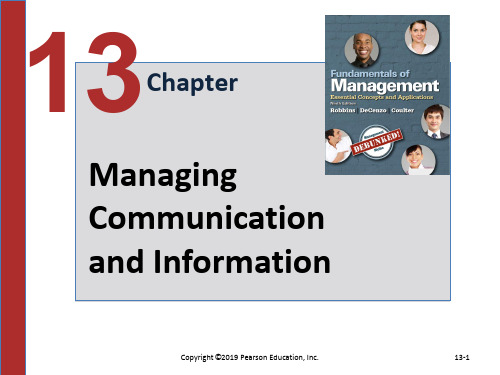
13-22
Legal and Security Issues
• Electronic information is potentially admissible in court
• Sensitive, proprietary information at risk
Copyright ©2019 Pearson Education, Inc.
Copyright ©2019 Pearson Education, Inc.
13-16
Networked Communication Applications
•E-mail •Instant messaging (IM) •Voice-mail •Fax machines
Copyright ©2019 Pearson Education, Inc.
managers need to know about communicating effectively.
Copyright ©2019 Pearson Education, Inc.
13-3
Effective Communication
Communication:
A transfer of understanding and meaning from one person to another.
Copyright ©2019 Pearson Education, Inc.
13-29
13-30
• Explain how technology affects managerial communication.
• Discuss contemporary issues in communication.
- 1、下载文档前请自行甄别文档内容的完整性,平台不提供额外的编辑、内容补充、找答案等附加服务。
- 2、"仅部分预览"的文档,不可在线预览部分如存在完整性等问题,可反馈申请退款(可完整预览的文档不适用该条件!)。
- 3、如文档侵犯您的权益,请联系客服反馈,我们会尽快为您处理(人工客服工作时间:9:00-18:30)。
管理学
第一章管理与组织
学习导览
一、管理者是谁?
It used to be sim ply defined that they were the organizational m em bers who told others what to do and how to do it, but it is not quite that sim ple anym ore. A m anager is som eone who coordinates or oversees the work of other people so that organizational goals can be accom plished. A m anager’s job is not about personal achievem ent, but about helping others do their work. That m ay m ean coordinating the work of a departm ental group, or supervising a single person. It could involve coordinating the work of a team com posed of people from several different departm ents or even people outside the organization, such as tem porary em ployees or em ployees who work for the organization’s suppliers. And m anagers m ay have other work duties not related to coordinating the work of others.
解释管理者与非管理的雇员有什么不同?
Nonm anagerial em ployees are those organizational m em bers who work directly on a job or task and have no one reporting to them.
组织中的管理者如何分类?
In traditionally structured organizations—whi ch are usually said to be shaped like a pyram id because there are m ore em ployees at lower organizational levels than at upper organizational levels, m anagers are often described as first-line, m iddle, or top, and m ay have various titles.
(1) First-line m anages, the lowest level of m anagem ent, m anage the work of nonm anagerial em ployees who are typically involved with producing the organization’s products or serving the organization’s custom ers. They often have the title of supervisor, and are called shift m anagers, district m anagers, departm ent m anagers, offi ce m anagers, or even foreperson.
(2) Middle m anagers include all levels of m anagem ent between the first level and the top level of the organization. These m anagers m anage the work of first-line m anagers and m ay have titles such as regional m anagers, project leader, plant m anager, or division m anager.
(3) Top m anagers: m anagers at or near the upper levels of the organizational structure who are responsible for m aking organization-wide deci sions and establishing plans and goals that effect the entire organization. These individuals typically have ti tles such as executive vice-president, president, chief operating officer, chief executive offi cer, or chairperson.
二、管理是什么?
Managem ent involves coordinating and overseeing the work activities of others so that their activities can be com pleted efficiently and effecti vely.
解释为什么对管理来说效率和效力是重要的。
Efficiency refers to getting the m ost output from the least am ount of inputs.—doing the things right, which is, not wasting resources.
Ef fectiveness is often described as “doing the right things”, that is, doing those work activi ties that will help the organization reach its goals.
Efficiency is concerned with the m eans of getting things down, whereas effectiveness is concerned with the ends, or attainm ent of organizational goals.
三、管理者做什么?
管理的四个功能:Planning, Organizing, Leading, Controlling
Planning: Defining goals, establishing strategy, developing plans to coordinate acti vities. Organizing: Determ ining what needs to be done, how i t will be done and who is to do it. Leading: Motivating, leading and any other activi ties involved in dealing with people. Controlling: Monitoring activities to ensure that they are accom plished as planned.
解释Mintzberg的管理角色:
Managem ent Roles refers to the specific categories of m anagerial behavior. Mintzbe rg’s m anagem ent roles are grouped around interpersonal relationships, the transfer of inform ation, and decision m aking.
1. Interpersonal roles are roles that invol ve people (subordinates or people outside the organization) and other duties that are cerem onial or sym bolic in nature. The three interpersonal roles include figurehead, leader and liaison.
2. Inform ational roles involve collecting, receiving and dissem inating inform ation. The three inform ational roles are m onitor, dissem inator and spokesperson.
3. Decisional roles entail m aking decisions or choices. The four decisional roles are entrepreneur, disturbance handler, resource allocator, and negotiator.
叙述Katz的三个管理技巧以及这些技巧的重要性根据管理级别是如何改变的
讨论影响管理者工作的改变
解释为什么消费者服务和创新对于管理者的工作是重要的
四、组织是什么?
组织的特征是什么
解释组织的概念是如何改变的
五、为什么要学习管理?
解释管理学概念的普遍性
管理和组织简介
管理者的为难。
